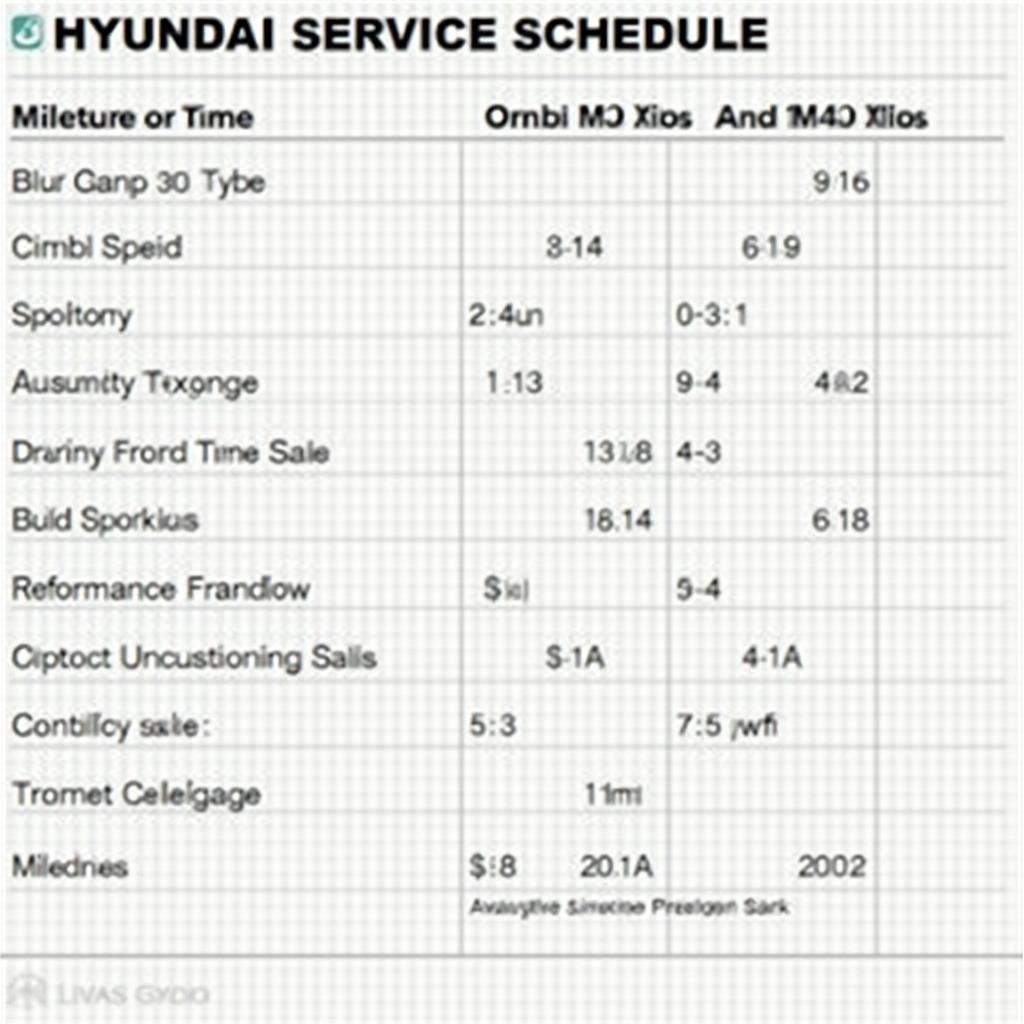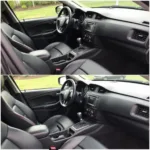Knowing when to service your Hyundai is crucial for its longevity and performance. While many factors influence the ideal Service Frequency Of Hyundai Cars, understanding the basics can help you keep your car running smoothly.
Decoding Your Hyundai’s Service Schedule
Hyundai provides a recommended service schedule in your owner’s manual. This schedule outlines key maintenance tasks at specific mileage or time intervals.
General Hyundai Service Intervals:
- Every 3,000-5,000 miles or 6 months: Oil and filter change, tire rotation, brake inspection.
- Every 15,000-30,000 miles: Air filter replacement, cabin air filter replacement, spark plug replacement (for gasoline engines), brake fluid flush.
- Every 60,000-90,000 miles: Coolant flush, transmission fluid flush (for automatic transmissions), timing belt replacement (for models with timing belts).
Important Considerations:
- Driving Conditions: Frequent city driving, towing, or driving in extreme weather conditions may require more frequent servicing.
- Oil Type: Synthetic oil typically allows for longer intervals between changes compared to conventional oil.
- Warning Lights: Never ignore dashboard warning lights, as they often indicate a problem requiring immediate attention.
Common Hyundai Service Needs
Here’s a breakdown of common services and their average frequency:
1. Oil Change
- Frequency: Every 3,000 miles or 6 months for conventional oil, every 5,000-7,500 miles for synthetic oil.
- Importance: Lubricates engine components, prevents overheating, and removes contaminants.
2. Tire Rotation
- Frequency: Every 5,000-7,500 miles.
- Importance: Ensures even tire wear, improving handling, fuel efficiency, and tire lifespan.
3. Brake Service
- Frequency: Inspection every 15,000 miles, fluid flush every 30,000 miles, pad/rotor replacement as needed.
- Importance: Essential for safe stopping distance and overall vehicle control.
4. Air Filter Replacement
- Frequency: Every 15,000-30,000 miles or annually.
- Importance: Clean air filters ensure optimal engine performance and fuel efficiency.
sharayu hyundai car service center navi mumbai
5. Coolant Flush
- Frequency: Every 60,000-100,000 miles.
- Importance: Protects the engine from overheating and corrosion.
“Regular servicing, though seemingly an additional expense, is an investment. It saves you from costly repairs down the line.” – David Miller, Senior Automotive Technician
Recognizing Service Indicators
Beyond the recommended schedule, your Hyundai will give you signs it’s time for service:
- Unusual Noises: Squealing brakes, grinding gears, or knocking sounds from the engine.
- Fluid Leaks: Puddles of oil, coolant, or other fluids under your car.
- Warning Lights: Check engine light, oil pressure light, or other dashboard warnings.
- Performance Issues: Decreased fuel efficiency, sluggish acceleration, or rough idling.
hyundai car service charges in dlhi
Hyundai Model-Specific Considerations
While general guidelines apply, specific models might have unique requirements:
- Hyundai Accent: Known for its reliability, but regular transmission fluid checks are crucial, especially for older models.
- Hyundai Elantra: Prone to issues with the suspension system; regular inspections are recommended.
- Hyundai Sonata: Pay close attention to the timing belt, which needs replacement around 60,000 miles.
hyundai car service schedule india accent
tips for servicing car hyundai eon
Prioritizing Preventive Maintenance
Sticking to the service frequency of hyundai cars ensures optimal performance and extends the life of your vehicle. By addressing minor issues before they escalate, you can avoid costly repairs and enjoy a smoother, safer driving experience.
hyundai i20 car service charges
Remember, consulting your owner’s manual and a trusted mechanic is crucial for tailoring the service schedule to your Hyundai’s specific needs.


